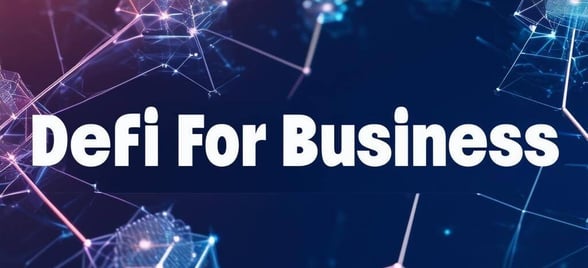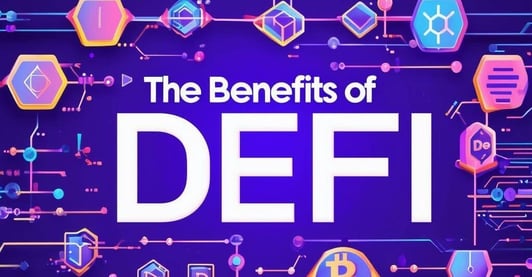What You Need To Know About Decentralized Finance (Defi) For Businesses

When it comes to the applications of technology in business, Decentralized Finance (DeFi) has been one of the most prominent examples. The space is worth billions of dollars and has been one of blockchain’s biggest wins. But what does this mean for businesses?
Much of the focus around DeFi is on how individuals use it, but how can business owners take advantage of it? The first step would be to better understand DeFi and how it works. In this article, we’ll explain all you need to know about DeFi for your business.
What is DeFi?
Decentralized Finance (DeFi) refers to the use of blockchain-based networks and tools to deliver financial services. As most of us know, blockchain technology is unique in that it creates networks that are not centrally controlled, which is why cryptos can be deployed without a singular force controlling them.
DeFi is essentially a way to offer the sorts of financial services we are used to but in a way that is not reliant on financial systems. These services benefit from the blockchain association by offering more control, privacy, security, and access for all.
How Can DeFi Be Used in Business?
As a business, you can take advantage of several DeFi-based services.
-
Lending and Borrowing
Several DeFi platforms allow users to both lend and borrow money. These are done by connecting users’ digital asset wallets to the platform, and transactions are deployed via smart contracts.
Once the parties involved agree to the terms, such as payback period, collateral, and interest rates, funds are automatically taken and returned when due. It is also worth noting that alternative cryptos can also be used for businesses. There is a huge market of people lending and borrowing meme coins as they appreciate in value and deliver even more profit. As Alan Draper explains, new meme coins are high in demand, especially in the world of DeFi.
DeFi-based lending and borrowing are especially useful for businesses because it bypasses the complex process of bank applications and can even be done anonymously. Plus, the use of smart contracts means that parties are less likely to default on their loans. On top of this, payments are completed automatically, meaning less hassle for all involved.
For those looking to access liquidity while holding onto their crypto, Vield offers BTC backed loans, allowing users to borrow against their assets without needing to sell them. This provides flexibility, especially in volatile markets where retaining ownership of digital assets can be crucial.
-
Insurance
Just like with lending and borrowing, DeFi offers businesses a chance to access insurance with fewer hassles. Insurance within the DeFi space relies on smart contracts for execution, often eliminating the need to file a claim. For example, your business took out insurance in the event of a hurricane in a particular area. The smart contract would then monitor weather conditions in the area, and if a verified hurricane occurs, the funds would be instantly paid out to the customers.
This saves the time and effort of filing a claim and dealing with the bureaucracy of proving that the conditions were met.
-
Crypto Exchanges
One of the most prominent uses of DeFi is swapping currencies, especially cryptos. Many crypto investors even prefer DeFi-based options to have their needs met because they are non-custodial. This means that, unlike centralized exchanges, they don’t need to deposit their crypto into the platform before they can trade, and this lets them retain control over their funds.
Individuals and businesses can swap tokens on DeFi platforms by connecting their crypto wallets. This allows them to withdraw and deposit tokens as needed while still allowing users to control their tokens and preserve their privacy.
-
Payments
Sending and receiving payments is a major consideration for most businesses, and DeFi can help with this. Several DeFi options exist that make the process of sending funds faster and cheaper for all parties. This typically works when one party deposits funds via crypto into a dedicated wallet. Another party receives private keys to a wallet with the corresponding amount and is able to access it after verifying their identity.
This is especially useful for cross-border transactions and can be done in seconds with pennies charged in transaction fees. Compared to the days it can take to do so via traditional methods and the large amounts charged, DeFi can be a lifesaver for businesses.
The Benefits of DeFi

DeFi has many benefits that businesses can take advantage of, some of which are as follows:
- Faster Transactions: Many DeFi transactions are completed using smart contracts and this saves time on both ends. In the case of insurance, you won’t need to file claims by yourself and when sending or receiving payments, days of waiting can be saved.
- Ease of Access: Many businesses have a major concern about not being able to access financial services like loans or insurance. However, DeFi works around this by allowing virtually anyone to enjoy these services. There is no lengthy application process, and no centralized body can stop you from accessing whatever you need.
- Increased Control: One feature of DeFi that stands out is the fact that it allows all participants to retain control over their assets. When trading, lending, or otherwise using funds on a DeFi platform, you don’t have to relinquish access to them to have your needs met. Instead, you can connect your digital asset wallet and complete transactions as usual.
The Risks of DeFi
While DeFi has much to offer business owners, there are also certain risks associated with it to be aware of.
- Lack of Regulation: The DeFi space is notoriously underregulated compared to the mainstream financial system and it is best to consider the implications of using it.
- Less Protection: While DeFi is not hindered by centralized processes, it also offers less protection than centralized systems would. In the case of a hack or network exploitation, there is less respite for users.
Conclusion
DeFi has risen to become a billion-dollar industry, and for good reason. As we've highlighted in this article, using DeFi for your business can mean accessing services you otherwise might miss out on, as well as saving time, money, and effort when navigating these different services.
Any business owner wanting to take advantage of DeFi should also be aware of its possible downsides, like less protection and less government regulation. Ultimately, it is up to each individual to decide whether DeFi’s offerings are right for them.